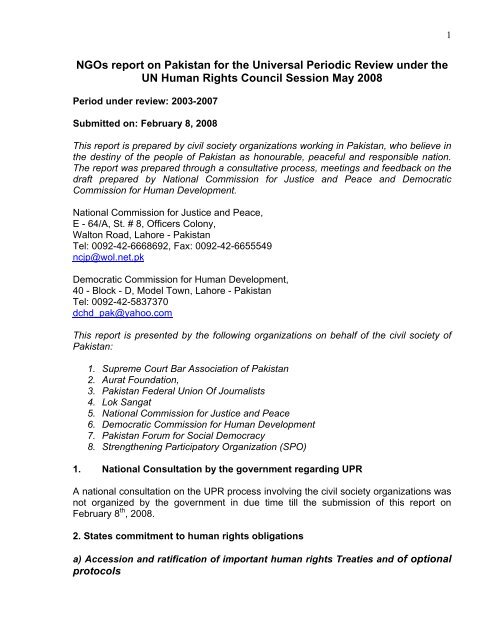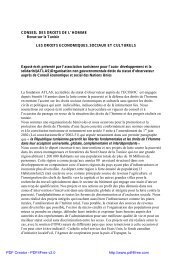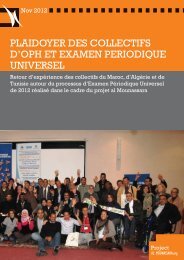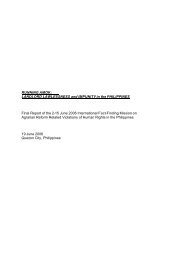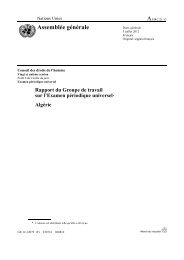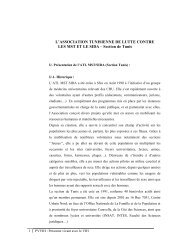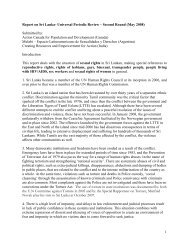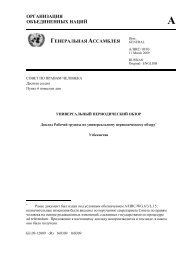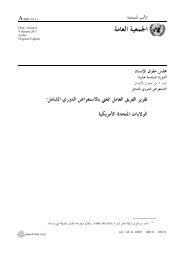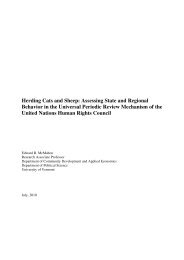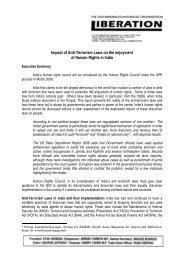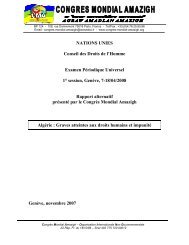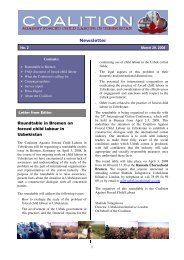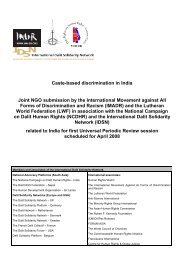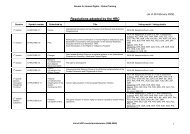E - Universal Periodic Review
E - Universal Periodic Review
E - Universal Periodic Review
Create successful ePaper yourself
Turn your PDF publications into a flip-book with our unique Google optimized e-Paper software.
1<br />
NGOs report on Pakistan for the <strong>Universal</strong> <strong>Periodic</strong> <strong>Review</strong> under the<br />
UN Human Rights Council Session May 2008<br />
Period under review: 2003-2007<br />
Submitted on: February 8, 2008<br />
This report is prepared by civil society organizations working in Pakistan, who believe in<br />
the destiny of the people of Pakistan as honourable, peaceful and responsible nation.<br />
The report was prepared through a consultative process, meetings and feedback on the<br />
draft prepared by National Commission for Justice and Peace and Democratic<br />
Commission for Human Development.<br />
National Commission for Justice and Peace,<br />
E - 64/A, St. # 8, Officers Colony,<br />
Walton Road, Lahore - Pakistan<br />
Tel: 0092-42-6668692, Fax: 0092-42-6655549<br />
ncjp@wol.net.pk<br />
Democratic Commission for Human Development,<br />
40 - Block - D, Model Town, Lahore - Pakistan<br />
Tel: 0092-42-5837370<br />
dchd_pak@yahoo.com<br />
This report is presented by the following organizations on behalf of the civil society of<br />
Pakistan:<br />
1. Supreme Court Bar Association of Pakistan<br />
2. Aurat Foundation,<br />
3. Pakistan Federal Union Of Journalists<br />
4. Lok Sangat<br />
5. National Commission for Justice and Peace<br />
6. Democratic Commission for Human Development<br />
7. Pakistan Forum for Social Democracy<br />
8. Strengthening Participatory Organization (SPO)<br />
1. National Consultation by the government regarding UPR<br />
A national consultation on the UPR process involving the civil society organizations was<br />
not organized by the government in due time till the submission of this report on<br />
February 8 th , 2008.<br />
2. States commitment to human rights obligations<br />
a) Accession and ratification of important human rights Treaties and of optional<br />
protocols
2<br />
Despite the pledges made during the candidacy for membership of the Human Rights<br />
Council in May 2006, the Government of Pakistan (GOP) failed to sign and ratify CAT,<br />
ICCPR and the International Convention on the Protection of the Rights of Migrant<br />
Workers and their Families. The ICESCR was signed, however, not ratified.<br />
b) Compliance of treaties signed<br />
Government of Pakistan ignored the almost all 18 recommendations 1 made by the<br />
Special Rapporteurs on freedom of religion or belief after his visit in 1995 about<br />
nondiscrimination on the basis of religion and bringing changes in laws and policies to<br />
building a culture of interfaith peace and tolerance, further the observations made by his<br />
successor in A/HRC/4/21/Add.1 para 243.<br />
The GOP also ignored the observations made by the Special Rapporteur on Violence<br />
Against Women about the protection of human rights defenders 2 . In its 71 st session,<br />
2007 ICERD Committee considered country situation in the absence of state party<br />
report and postponed the review of overdue periodic reports 15 th to 19 th as committee<br />
granted additional time for the submission of the reports at the request of the GOP. Now<br />
the overdue reports submitted by the state party will be considered in 2009. Three<br />
reports of compliance of CEDAW treaty were submitted together, two after a delay of six<br />
and three years respectively.<br />
c) Human Rights and National legislation<br />
I. The Constitution and other substantive laws<br />
Laws that were discriminatory and against the human rights standards continued to be<br />
part of the statute. Moreover the will to implement the existing safeguards and stopping<br />
abuse of laws on part of the government seemed lacking.<br />
During the period under review, GOP failed to bring changes in the National laws that<br />
violate human rights e.g. Hadood and Zina Ordinance, Qisas and Diyat Ordinance<br />
continued to be part of law despite a clear recommendation for a repeal by National<br />
Commission on Status of Women 3 in 2003 and the Inquiry Commission on Status of<br />
women constituted by the government 1997. A women’s Protection Act 2006 was<br />
passed to amend Hadood laws against the civil society demands for repeal, thus<br />
discriminations on the basis of religion in qualification of witness and judges remained in<br />
the law.<br />
The following laws and their application denied the right of humane treatment of<br />
1 E/CN.4/1996/95/Add.1 para 81-98<br />
2 Para 71-72, of E/CN.4/2000/68/Add.4<br />
3 The state of human rights 2003, HRCP, Maktaba-e-Jadeed, Lahore, p.231<br />
Report Inquiry Commission on Status of Women, 1997
3<br />
prisoners, including the universal non-derogable prohibition against torture and due<br />
process of law.<br />
II) Allowance of summary, unjust trials and mental torture<br />
Anti-Terrorism Act, 1997 maintains; presumption of guilt or places onus of proof on the<br />
accused, does not acknowledge mental torture as torture and in absentia trial, accused<br />
statement before the police as evidence 4 in criminal charges.<br />
III) Arbitrary detentions and lack of due process of law<br />
The Maintenance of Public Order Ordinance 5 is a violation of legal rights of the<br />
detainees under UDHR and ICCPR, thousands of persons were arrested under<br />
preventive detentions for months, especially the lawyers heading the movement for rule<br />
of law in 2007. Secondly, the law has been grossly abused in application – to arrest<br />
political workers and human rights defenders arbitrarily, without stating the ‘reason’ for<br />
arrest, without a formal charge and having to prove any offense and in some cases, the<br />
detention was prolonged without showing a sufficient cause of detention in a competent<br />
court.<br />
IV. Non – discrimination in the political order<br />
Under the circular No. F-1(6)/2001-Cord issued by Election Commission of Pakistan,<br />
maintained separate electoral lists for the members of Ahmadi community which is a<br />
source of sheer religious discrimination and reason for disenfranchisement of the<br />
Ahmadi community.<br />
3. Institutional framework for protection of Human Rights<br />
a) Independence of Judiciary<br />
GOP showed an utter disregard to the International standards protecting the<br />
independence of lawyers and judges including those embodied in the UN Basic<br />
Principles on the Role of Lawyers and the Basic Principles on the Independence of the<br />
Judiciary. The non-derogability of judicial independence is a requirement and the<br />
foundation of all international and domestic human rights and humanitarian law and is<br />
secured by many instruments including all four Geneva Conventions, (common article<br />
3), Protocols I and II to the Geneva Conventions, ICCPR, UDHR and the Basic<br />
Principles on the Role of Judges.<br />
The judiciary, usually the most effective institution for protection of human rights<br />
remained under attack, physically and by way of interference on part of the executive as<br />
shown in following examples;<br />
4 Section 19 - 19 (10), Anti Terrorism Act, 1997<br />
5 Section 16, Maintenance of Public Order Ordinance,
4<br />
• The Chief Justice of the Supreme Court was unconstitutionally suspended under<br />
fabricated charges in March 2007,<br />
• The interference with Judiciary’s work did not stop even after his reinstatement<br />
by the Supreme Court in July 2007, raising perks and privileges of Judges of<br />
High Court and Supreme Court 6 and change of retirement age without a sanction<br />
of parliament,<br />
• Tempering with Judicial system using unpredicted presidential powers in the<br />
period during elections, creating a High Court in Islamabad, without a parliament,<br />
• The civil officers defied the Court orders in a number of cases (disappearances,<br />
Manu Bheel, baton charging of journalists and lawyers in Islamabad October<br />
2007),<br />
• Dislodging over a half of Higher and Superior judiciary (55 out of 107 total) on<br />
Nov.3, 2007, by imposition of emergency,<br />
• During the lawyers’ movement starting in March 2007 for restoration of Chief<br />
Justice of Supreme Court Iftikhar Mohammad Chaudhry, the lawyers were<br />
subjected to unprecedented police torture and violence in defiance of the<br />
fundamental rights guaranteed under the Constitution of Pakistan. On March 16,<br />
the police entered the Lahore High Court Bar Association office used tear gass<br />
and resorted to ruthless baton charge on the lawyers resulting in serious injuries.<br />
In May the GOP demonstrated a tyrannical at Sahiwal when dozens of lawyers<br />
were burnt after being dozed with petrol on them. On May 12, 2007 killing pf<br />
about 40 innocent persons in Karachi to stop the Chief Justice from addressing<br />
the High Court Bar Karachi. In July, killing of about 12 persons in ISalamabad<br />
through terrorism to prevent the Chief Justice from addressing the Bar.<br />
• After imposition of Emergency, the leading lawyers Aitezaz Ahsan Chaudhry<br />
Amin Javed, Ali Ahmad Kurd, Munir A Malik, Justice (r) Tariq Mehmood and a<br />
large number of lawyers were kept in detention without a legal justification.<br />
b) Imposition of Emergency Rule<br />
Holding the constitution in abeyance was itself a blow to fundamental rights of the<br />
citizens however GOP went on to curtail civil and political rights by introducing stringent<br />
laws and regulations e.g. Pakistan Army Act, 1952 was amended to allow the court<br />
martial of civilians by a military court. 7<br />
The proclamation of Emergency by an Army Chief lacked legitimacy and violated the<br />
6 Salary of Judges of Superior Courts Order 2007 (Order 1 of 2007, August 3 rd ), Supreme Court Judges (Leave,<br />
Pension and Privileges) Order, 2007 (Oredr 2, 2007, August 3 rd ) High Court Judges (Leave, Pension and Privileges)<br />
Order, 1997 (amended via order 3, 2007, August 3 rd )<br />
7 Order LXVI of 2007, November 10 th
5<br />
Pakistan as well as international laws.<br />
In an joint open letter 8 the Lawyers Rights Watch Canada (LRWC), the Asian Legal<br />
Resource Centre (ALRC) and the Dutch Lawyers for Lawyers Foundation (L4L) call for<br />
questioned the emergency on following grounds; ‘To be lawful and legitimate the<br />
imposition, duration and removal of emergency measures by any state, must meet the<br />
10-principle test of the United Nations standards. The Proclamation of Emergency of<br />
November 3, 2007 failed to meet all 10 of the UN criteria for legitimate emergency<br />
measures: regarding legality, proclamation, notification, time limitation, existence of<br />
exceptional threat, proportionality, non-discrimination, compatibility, concordance and<br />
complementarity with international law and preservation of non-derogable rights.<br />
Access to judicial safeguards of non-derogable rights remains an absolute requirement<br />
during emergency measures. Actions that compromise or destroy judicial<br />
independence, such as those taken by the Musharraf regime, render even emergency<br />
measures that meet UN standards, illegal.’<br />
After milling the political gains the emergency was lifted on December 15, 2007,<br />
however irreparable damage was inflicted to the existing institutional framework for<br />
protection of human rights. Moreover the several laws and regulations made during the<br />
state of emergency were made part of the statute.<br />
c) Lack of human rights policy and implementation mechanism for human rights<br />
GOP failed to make a human rights policy in the country. No effort was made to develop<br />
any mechanism for implementation of the commitments under the International human<br />
rights treaties and independent assessment of the performance thereof.<br />
4. National Human Rights Institutions<br />
a) National Human Rights institutions do not exist in the real sense (according to the<br />
Paris Principles). A promise was made in a Presidential speech in the National Human<br />
Rights conference in April 2000 to make a National Human Rights Commission which<br />
remained unfulfilled. A bill initiated in the National Assembly in 2004 was never debated<br />
in the parliament till 2007.<br />
b) The National Commission on Status of Women (NCSW) was formed in 2001, but its<br />
recommendations about repeal of Hudood laws (2003) were never heeded to. The<br />
NCSW also lacked; enabling mandate, independence to carry out its mandate,<br />
adequate human and financial resource and the powers to investigate and redress the<br />
human rights violations. 9<br />
c) The Directorate of Human rights working under the Ministry of Law and Justice<br />
performs merely as a charity wing of the Ministry. The Directorate is run by civil servants<br />
and lacks any mandate to advise or supervise and legislation, monitoring of the<br />
8 www.lrwc.org; lrwc@portal.ca; alrc@alrc.net; www.alrc.net http://www.advocatenvooradvocaten.nl<br />
9 www.ncsw.gov.pk, annual report 2001 pp. 45-47
6<br />
implementation of human rights or investigate human rights abuses.<br />
d) The government also claimed existence of a Minorities Commission, however, it is<br />
neither statutory nor a representative and autonomous body. It is composed of a few<br />
parliamentarians without a mandate to safeguard minorities’ human rights.<br />
e) The GOP showed no inclination to encourage right based NGOs to participate in<br />
discourses or policy making.<br />
5. State of General obligations under UN Charter and UDHR<br />
The enjoyment of the right to security and safety of the human person remained an<br />
elusive dream as the GOP failed to maintain and promote peace. Militaristic solutions<br />
were considered best where the political option could have worked better. Rs. 275<br />
billion, were allocated to defense whereas education received only 39 billion in the<br />
federal budget, for 2007-08 year. As meager as 0.51% of the GDP was being spent on<br />
health and nutrition. The health expenditure as percentage of GDP remained stagnant<br />
0.7 from fiscal year 2001 to 2003 and further declined to 0.6 in the fiscal year 2005-06. 10<br />
It is no surprise that the experts have expressed apprehensions about the possibility of<br />
Millennium Development Goals met by Pakistan.<br />
a) Disappearances<br />
There were complaints of thousands of involuntary disappearances especially in<br />
Baluchistan and NWFP during 2005-06. The Human Rights Commission of Pakistan<br />
(HRCP), an NGO, filed a petition in the Supreme Court (SC) of Pakistan against forced<br />
disappearances in early 2007 with a little over 100 names that swelled to 198 before the<br />
emergency was pronounced on November 3 rd . Of that list, the government told the court<br />
of around 99 disappeared persons that it had ’traced.’ Ninety-nine remained<br />
unaccounted for. Only half of those traced had actually been released. Those released<br />
have alleged torture and inhumane treatment and lack of access to due process, as well<br />
as access to lawyers and family.<br />
It was noted in late 2007 that the secret agencies continued to illegally pick up<br />
individuals days after the SC urged locating the people missing. With the judicial purge<br />
accompanying the Nov. 3 rd declaration of a state of emergency, the SC simply stopped<br />
hearing the petitions against enforced disappearances.<br />
b) Civil liberties and Freedom of expression<br />
Curbs on peaceful assembly and restrictions brought through an amendment to the<br />
laws dealing with media were massively used 11 . Thousands of lawyers, political workers<br />
and human rights defenders were beaten, humiliated and imprisoned during 2007 alone<br />
10 College of Physicians and Surgeons of Pakistan, www.cpsp.edu.pk/bulletin%archieves/march06/chapter1<br />
11 Section 144, Criminal Procedure Code of Pakistan
7<br />
for merely exercising their right to free speech and peaceful assembly.<br />
While illegal radio stations run by the local Taliban continued to operate with impunity<br />
and the shops selling Music and films were blown with bombs, the legal and open<br />
media faced press advices, threats and closures. Pakistan Electronic Media Regulatory<br />
Authority Ordinance 2002 was amended via ordinance LXV of 2007, on the November<br />
3 rd to suppress to dissenting voices and facilitate the onslaught of emergency.<br />
Between 2000 and 2007, 31 journalists were killed, 315 injured, 387 arrested or<br />
kidnapped, 193 intimidated and 109 banned, according to Intermedia.<br />
In 2007, 11 journalists were killed, 215 injured, 325 kidnapped, 79 intimidated and 43<br />
banned.10 journalists were arrested and 34 booked under Anti-Terrorism law since<br />
December 27, 2007 after the assassination of Benazir Bhutto, former Prime Minister of<br />
Pakistan. According to the reports the police raided the houses of journalists and<br />
arrested 19 in Sindh province alone 12 .<br />
According to the Pakistan Federal Union of Journalists 13 , during 2007 the government<br />
agencies pressurized the media through new laws and threats. Houses of media<br />
personnel were attacked, raided by the police and security agencies using two<br />
ordinances against the media after the promulgation of state of emergency in the<br />
country. Pakistan’s mainstream private television news channels remained under<br />
‘official scrutiny’ and several received ‘Press advices’ throughout the year, even before<br />
the closure of around 45 TV channels, mainly news channels on November 3, 2007.<br />
Beside attacks on journalists, their families were subjected to violence and intimidation.<br />
Brothers of two journalists were killed, one reportedly by a non-state actor, another by<br />
an unidentified person, the families had to migrate, while dozens in different parts of the<br />
country were forced to relinquish the profession.<br />
c) Talibanization (Maintenance of public order, security to life and liberty):<br />
While the government cracked down on the democratic and peaceful citizens<br />
organizations the Taliban phenomenon extended itself to northern Pakistan. Apart from<br />
Waziristan, the tribal agencies of Bajaur and Mohmand, and areas of NWFP especially<br />
the districts of Peshawar, Swat, Malakand, Tank, Dera Ismail Khan, Bannu, Lakki<br />
Marwat, Kohat, Mardan, Swabi, Charssada and Buner became centres of the activities<br />
of the pro-Taliban elements.<br />
Girls’ schools and their female staff, hair-dresser shops, CDs, dish antennas, television<br />
and polio vaccination have been target of bomb blasts, suicide attacks, target killing of<br />
law-enforcement personnel and innocent civilians.<br />
The Lal Masjid (red mosque) row in Islamabad, the federal capital of Pakistan, in July<br />
2007, exposed the extent of the penetration of religious fanatics. The activities of the<br />
12 Intermedia Islamabad, www.intermedia.org.pk<br />
13 www.pfuj.info
8<br />
burqa-clad female vigilantes of Jamia Hafsa (girls’seminary) started with a raid on a<br />
private residence, going around and telling video shop owners to change their business<br />
and finally it enhanced to the extent of kidnapping six Chinese women on charge of<br />
indulging in immoral acts. Following an eight-day standoff between the security forces<br />
and militants and students holed up in the Lal Masjid-Jamia Hafsa compound, the<br />
rebellious cleric Ghazi Abdur Rasheed was killed in a fierce battle in which the<br />
government claimed 58 persons including eight soldiers were killed.<br />
Several hundreds of people were killed in the Military operation since 2004 in<br />
Baluchistan Province including 80 years old Tribal Chief Nawab Akbar Bugti in 2006<br />
and Balach Mari in 2007. While many like Sardar Akhtar Mengal the former Chief<br />
Minister of the Province, journalist and human rights defenders were arrested under<br />
flimsy charges, some like Senator Sana Ullah Baloch were forced to live in exile.<br />
The civil society organizations are of the view that the government failed in maintaining<br />
law and order and saving Pakistan from Talibalization because it lacked transparency in<br />
the counter – terrorism operations, governance by rule of law and popular mandate.<br />
d) Attacks on NGOs<br />
There were at least three major grenade and bomb attacks on the offices and staff of<br />
non-governmental organizations working in some of these areas, in 2007 alone. The<br />
offices of Strengthening Participatory Organization (SPO) were attacked twice, in<br />
September and November 2007, in Dera Ismail Khan and Battagram, respectively, and<br />
resulted in massive destruction and serious injuries to the NGO personnel. The<br />
Battagram office of Sungi Development Foundation, another NGO, was also attacked<br />
with grenades in December 2007, resulting in heavy damage to the building and<br />
equipment.<br />
e) Rights to education<br />
50 million (nearly 1/3) of the population is illiterate. It is because the GOP failed to make<br />
education its priority, a paltry share of 2.42 percent of the budget was allocated in 2007-<br />
08 on public education. 14 A huge disparity exists in the literacy ratio between men and<br />
women due to unequal access to education for girls and gender biases in education<br />
materials persist.<br />
f) Education in mother tongue and other cultural rights<br />
With regard to cultural rights enunciated in ICESCR 15 , CRC 16 , and UNESCO<br />
Declaration on Cultural Diversity 17 , a great majority of children were deprived of their<br />
cultural rights as there is no arrangement for imparting school level education in their<br />
14 www.usaid.gov/pk/education/index<br />
15 Art. 15, International Convent on Economic, Social and Cultural Rights<br />
16 Art. 4, Convention on the Rights of the Child<br />
17 Art. 5, Cultural Rights as enabling environment for Cultural Diversity
9<br />
mother tongue. Urdu which is mother tongue of merely 7.57 percent of the population is<br />
the medium of instruction for nearly 58 percent 18 children (Punjabi, Pushto, Saraiki,<br />
Balochi and other), are forced to take instruction which is not their mother tongue.<br />
6. Recommendations to the GOP and Human Rights Council:<br />
1. The GOP should make a national human rights policy, to sign and ratify all<br />
human rights treaties of the UN without conditions, chart out an implementation<br />
mechanism and submit reports to the treaty monitoring bodies on regular basis;<br />
2. Pakistan government should invite the UN High Commissioner on Human Rights<br />
to carry out a fact finding visit to assess the human rights situation and give<br />
recommendations to improve the conditions;<br />
3. The human rights situation in Pakistan has a bearing on the peace and security<br />
of the whole region. Moreover, national and regional Human Rights mechanisms do not<br />
exist therefore a special session of the HR Council should be convened discussed the<br />
situation in the country. The GOP should also honour the request made by the Special<br />
Procedures to carry out a fact finding visit of Pakistan and invite them without delay;<br />
4. The government formed after the Elections in February 2008 must ensure the<br />
independence of judiciary by restoring the pre-emergency judiciary and the Constitution<br />
in its pre - 1999 form. The counter – terrorism policies should be debated in the<br />
parliament and reviewed to restructure the internal governance;<br />
5. All amendments made in different laws during state of emergency through<br />
Presidential Ordinances should either be withdrawn or should be approved only in a due<br />
process by the parliament;<br />
6. Curbs on media must be removed and freedom of expression must be ensured,<br />
amendments to PERMA Ordinance be withdrawn and laws regulating press be brought<br />
in conformity with human rights;<br />
7. The elected GOP should make a human rights policy and legislate to create<br />
independent and credible National Human Rights Institutions according to the Paris<br />
Principles of the UN;<br />
8. The GOP should ensure allocation of 10 percent of GNP for education and 5<br />
percent for public health in the Federal and Provincial budgets;<br />
9. In order to restore Pakistani society’s cultural and religious diversity, the GOP<br />
should acknowledge the religious, linguistic and cultural plurality in a federal legislation<br />
and to make arrangements to make the mother tongue as medium of instruction as<br />
soon as possible;<br />
18 Population by Mother Tongue, Statistics division, Government of Pakistan,
10<br />
10. All human rights defenders, political workers, journalists, lawyers and members<br />
of the judiciary who were arrested during the emergency must be released immediately.<br />
The government should also ensure safety and security for the NGOs, specially for the<br />
female workers;<br />
11. The GOP must put an end to involuntary disappearances and make the law<br />
enforcement agencies responsible for extra judicial detentions and involuntary<br />
disappearances accountable to the law;<br />
12. The GOP must show a commitment to human rights in action, not only in the<br />
Human Rights Council and other international forums, but also in all its legislation and in<br />
its national policies. All laws that discriminate and are violation of human rights<br />
standards should be repealed in light of the recommendations of Commission of Inquiry<br />
(1997), National Commission on Status of Women (2003), and the UN Special<br />
Rapporteurs and treaty monitoring bodies;<br />
13. We urge the GOP to appoint a Commission of Inquiry to study the impact of<br />
blasphemy laws, make the outcome of the study public and review the procedure of<br />
investigation, registration of cases and trial to stop the abuse of religion and law.


